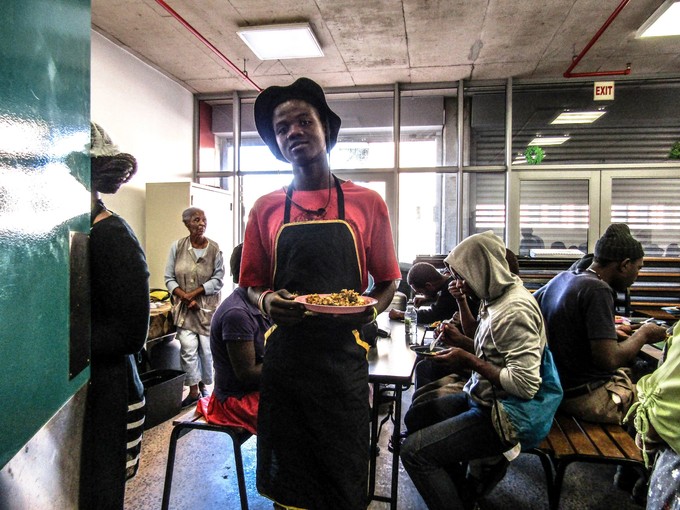
Sphamandla Zuma now works with the homeless at the Denis Hurley Centre in Durban. Photo: Sithembiso Shoba
8 July 2016
He started living on the streets a year ago when he was 19.
Zuma was born near Pinetown, west of Durban. His mother, a domestic worker who had separated from his father, died from TB when he was nine years old.
Until a few months before she died, he had not been to school. “The schools did not accept me because they asked for a birth certificate and my mother did not have this document,” says Zuma.
A local church intervened and helped his mother obtain a birth certificate.
“She was washing clothes and dishes in some homes and could buy food. She bought me clothes and shoes to go to school,” he says.
But after his mother’s death, Zuma and his older sister went to live with their grandmother and uncle and he stopped school.and went to work in the fields.
“I took the cattle to pasture … I herded three cows per day. I received between R10 and R20 when I herded for a half day and R50 when I pastured all day long,” he says.
He shared a room with a cousin for a while, then lived at a shelter, where he learned to love hip-hop. When his family tried to remove him from the shelter, he left for Durban and a life on the streets.
A study published in June by the Human Sciences Research Council found 1,959 homeless people sleeping on the streets and 1,974 sleeping in shelters.
Of the total, 88% are male; 87% are black; 29% are under 25 years of age; 12% are foreign nationals.
Though 69% have a place off the street they call home; more than half of these don’t go home either because there are not enough money at home or because they no longer have a relationship with their family or community, the survey found.
Two fifths say they are on the streets because they are seeking employment. Only 1% say they do not want to get off the streets.
Zuma arrived with a backpack full of clothes, but it was soon stolen. “Three men came to me when I was sleeping in Durban Station and asked me why I had a beautiful bag. One slapped me and another pulled out a knife. I handed them the bag.”
“One night, I was sleeping on cardboard and a man came and started to beat me and took my cardboard. He nearly killed me,” says Zuma.
He hung around supermarkets, offering to help customers with their grocery bags, accepting whatever money he was given, making about R30 a day.
I just asked for anything because anything was enough,” he says.
One day, he made R70. “I was happy and went to Durban Station to buy food and met again the men who had stolen my bag. They said, you again. One of them pointed a knife at my neck and the other took all my money.”
Then a friend told him about the Denis Hurley Centre, and he started to go there every day to get food. He started collecting tins to sell, selling three kilos for R30 to a store that recycled and also supplied art producers.
Zuma is now a dedicated volunteer at the Centre, helping prepare and serve meals to homeless and needy people.
“I would like to study, to have a home, work and be a successful musician.”
He says he has never met his father, but would like to. “I have the right to paternity; I need a hug and the words of a father”.